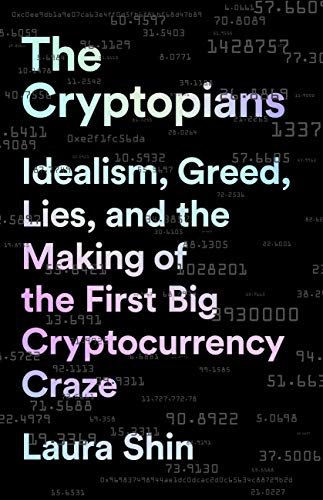Web3 Book List: Reading to Help Understand Blockchain in Historical Context
The web3 world is weird, wacky, and wild. Lots of new terms, fast-moving discord chats, and blocky pseudonyms. How do you find the right perspective to see the long-arc of a transformative new technology? Read.
Read books. Reading is no substitute for using new tools, playing around, and getting experience, but it complements that approach and gives you context on what is happening, and why it matters.
Here, I share the books with ideas or models that helped me fit new blockchain technology into my model of the world and start to see how things will change over the next 20 years.
First, a few books (mostly about history) that are the foundation of seeing “why this matters.” Details of a technology are irrelevant if we don’t have the context to see how the new technology impacts society.
(Specifically chapter 2: The Tree of Knowledge)
A lifelong history professor’s magnum opus on humanity from the beginning of time through today, and projecting into tomorrow. This book Is unique in showing the true power of Homo Sapiens (us, hello fellow human) as a species with the ability to organize collecting effort and strategize.
While this book has *nothing* to do with the blockchain, it is the foundation of understanding the importance of how humans cooperate. The blockchain will advance our ability to cooperate (by decreasing the cost of trust, and lowering the cost of communications)
We don’t think of organizational structures as technologies, but they are. The village was a technology, the church is a technology, and federal governments are technology.
One of the most transformative technologies of our era is hiding in plain sight: the company. Specifically, the limited liability company.
Blockchains may enable a new type of organizing technology: the network. To help us understand the impact of a new organizing technology, we can read this history of the company and project some of these lessons forward.
Technological Revolutions and Financial Capital by Carlota Perez
This is a classic book in the technology world by economist Carlota Perez. It shows that new technologies are fully deployed into society in a similar pattern. Not necessarily predictable, but patterned.
“The main contention is that the full fruits of the technological revolutions that occur every half century are only widely reaped with a time-lag. Two or three decades of turbulent adaptation and assimilation elapse…”
Technological revolutions have early believers, financiers, and boom/bust cycles of expectation and reality.
With this template, we can begin to understand how the next decade or two may unfold as social, managerial, and political practices begin to adapt to accommodate this new technology.
Sovereign Individual by James Dale Davidson and Lord William Rees-Mogg
Specifically chapters 7 (Transcending Locality: The Emergence of the Cybereconomy) and 8 (The End of Egalitarian Economics: Revolutions in Earnings Capacity in a World Without Jobs)
This book was written by a pair of futurists in 1997, full of predictions about the coming decades. While some predictions are off (as would be expected) some are spot on. More important than the specific predications is the thought process, and learning about long-arc trends that we see continuing.
Reading material like this gives you practice at predicting the future — whether you agree or disagree with the authors. I like to treat reading like a conversation with the author. (“I call bullshit on this whole chapter! What do you have to say about that? Nothing! That’s what I thought!”) And having these conversations about the impact that technology and long-term trends have on society is both fun and useful.
The authors do a good job of reaching far back into history to find patterns, which is fun and useful.
If you don’t want to read all these, just follow Chris Dixon, who has read broadly about the history of technology, and manages the crypto funds at A16Z. He tweets often about how this blockchain revolution will unfold.
Blockchain Books + Resources
Now, we get into some books more specifically about blockchains themselves.
Excellent book about the history of Ethereum, and the team that conceived and created it. I learned a lot reading this book, which covers early blockchain industry, the goal and vision for Ethereum, early exploits, and the 2017 ICO craze.
What I didn’t realize until reading this book was the legal innovations that accompanied the technological innovations. Ethereum (the non-profit foundation) had to be headquartered in Switzerland. Eth (the token) had to be classified as a utility token (rather than a security) by the SEC.
A fascinating look at one of the pioneering organizations and technologies of web3.
Web3 Book Recommendations
Having only read 1-2 of these myself yet, I asked Twitter for recommendations and got some great ones.
From Dan Hannum (@DHannum8) of ZenLedgerIO
“Programming Bitcoin by Jimmy Song
Kicking the Hornets Nest - The Complete Writings, Emails, and Forum Posts of Satoshi Nakamoto”
“Also Sci Fi, imho, is the best source of inspiration and warnings for builders:
Change Agent (actually mentions cryptocurrencies)”
Our crypto gandalf Jason Hitchcock also recommended Mirror World as good sci-fi.
Books about Web1 and Web2
Reading some books on the founding of web1 and web2 companies may also give a sense of what founding companies is like in the early stages of technological revolutions, when most people are dubious of new technologies. Each company overcame its own form of perception, regulatory, and technological challenges to become a web2 behemoth.
Super Pumped (Uber)
The Everything Store (Amazon)
That Will Never Work (Netflix)
What have you read that helped you understand web3? Drop comments or links for web3 resources, I’m always looking for new reading recommendations.







